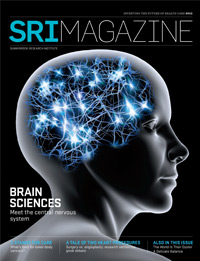Donor Profile
Supporting Excellence
Sonja and Michael Koerner establish Canada’s premier hearing regeneration lab
About three million Canadians have a hearing disability. Hearing loss is the fastest growing, and one of the most common chronic, conditions facing older adults.
In support of exploring new frontiers in hearing, Sonja and Michael Koerner established the Sonja N. Koerner Hearing Regeneration Laboratory at Sunnybrook Research Institute (SRI). As Canada’s only research lab in hearing regeneration, it has become the most important initiative in inner ear research in the country, and among the best in North America.
“The point of giving the gift was that someone helped me when I needed help, and we were able to return the gesture,” says Sonja, who lost her balance due to a viral infection in her left inner ear a few years ago. “I couldn’t walk in a straight line, and Dr. Julian Nedzelski was most helpful.” Nedzelski is part of Sunnybrook’s otolaryngology team, led by Dr. Joseph Chen. Nedzelski specializes in cochlear implantations, and treating dizziness and imbalance.
Dr. Alain Dabdoub, a scientist in the Hurvitz Brain Sciences Research Program at SRI and an assistant professor at the University of Toronto, moved from the University of California, San Diego, to Toronto to become the research director of the Koerner Laboratory. His team aims to understand and discover how to regenerate hair cells of the inner ear in humans. Hair cells are essential for balance and help convert acoustic energy into electrical signals that travel through the auditory nerve to the brain, where sound is interpreted. Studies have shown non-mammals, such as birds and fish, can regenerate lost hair cells.
In November 2013, Sonja and Michael met with Dabdoub to learn more about his research and work with Dr. Vincent Lin, a clinician-scientist in the Hurvitz Brain Sciences Research Program and assistant professor at U of T. The two are collaborating to discover what happens inside the ear during development and aging, and how drugs and gene therapy can be used to reverse hearing loss. Lin’s lab focuses on the cellular and molecular pathways related to regeneration and age-related hearing disability, and ways to develop therapeutic interventions. (Click here for more.)
“I was very encouraged by the progress, and I think Dr. Dabdoub is making a huge difference,” Michael says. “What he’s doing at Sunnybrook is leading-edge work.”
When asked why they chose to give to Sunnybrook, Sonja responds, laughing, “Well, it’s across the street.” Lightheartedness aside, as residents of the community, they are committed volunteers and members of the Sunnybrook Foundation Governing Council. Sonja joined Sunnybrook’s Board of Trustees in 1988 and served until 2002, when she retired as vice-chair. “I sat on the board for nine years, and it was fascinating to learn about all the problems that were brought up,” Sonja says.
The Koerner Foundation, established 30 years ago, is perhaps best known for its support of the Art Gallery of Ontario, Royal Conservatory of Music and the Museum of Anthropology at the University of British Columbia, but its mandate to support excellence goes beyond the arts. “When I wrote the purposes of the foundation, one was to alleviate suffering,” Michael says. “That’s exactly what this [gift] is. It’s tough not to have your balance, and we felt there must be some sort of solution.”
Sonja and Michael say they will continue to support Canadian scientists and their projects (including two other programs in brain research in Toronto and Vancouver). “Equipment and knowledge are evolving very fast, and the strides that could be made in medical research over the next decade could be immense,” Michael says. “That’s the excitement and hope that I have.”
— Eleni Kanavas





